UK News
-
 SFO launches international bribery probe into data centre contract
The Serious Fraud Office (SFO) has launched a multi-million pound international bribery investigation, conducting raids on five properties and arresting three individuals.Read More...
SFO launches international bribery probe into data centre contract
The Serious Fraud Office (SFO) has launched a multi-million pound international bribery investigation, conducting raids on five properties and arresting three individuals.Read More... -
 Nigel Farage and Reform UK face crucial test in local elections
Reform UK leader Nigel Farage is facing a major test in the UK’s local elections this Wednesday, as his party attempts to capitalize on growing support and position itself as a seriousRead More...
Nigel Farage and Reform UK face crucial test in local elections
Reform UK leader Nigel Farage is facing a major test in the UK’s local elections this Wednesday, as his party attempts to capitalize on growing support and position itself as a seriousRead More... -
 Chancellor Rachel Reeves under investigation over gifted theatre tickets
Chancellor Rachel Reeves is under investigation by Parliament's standards commissioner concerning her entries in the Commons register of interests.Read More...
Chancellor Rachel Reeves under investigation over gifted theatre tickets
Chancellor Rachel Reeves is under investigation by Parliament's standards commissioner concerning her entries in the Commons register of interests.Read More... -
 Families to gain more choice in home heating upgrades
Families across the UK could soon have greater flexibility when upgrading their home heating systems, thanks to new government proposals aimed at boosting green energy and loweringRead More...
Families to gain more choice in home heating upgrades
Families across the UK could soon have greater flexibility when upgrading their home heating systems, thanks to new government proposals aimed at boosting green energy and loweringRead More... -
 UK to introduce crypto regulation in line with U.S. approach
The UK government announced plans to bring cryptocurrencies under formal financial regulation, aligning more closely with the United States rather than the European Union. Finance MinisterRead More...
UK to introduce crypto regulation in line with U.S. approach
The UK government announced plans to bring cryptocurrencies under formal financial regulation, aligning more closely with the United States rather than the European Union. Finance MinisterRead More...

Culture
-
 Harrogate’s cherry blossoms rival Japan’s sakura season
While Japan’s iconic cherry blossom season draws millions each year, a town in North Yorkshire is proving you don’t need to fly 6,000 miles to experience the magic.Read More...
Harrogate’s cherry blossoms rival Japan’s sakura season
While Japan’s iconic cherry blossom season draws millions each year, a town in North Yorkshire is proving you don’t need to fly 6,000 miles to experience the magic.Read More... -
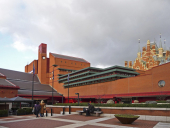 British Library set for £1.1 billion expansion
The British Library, the largest in the UK, is set for a major transformation with a £1.1 billion expansion project now approved.Read More...
British Library set for £1.1 billion expansion
The British Library, the largest in the UK, is set for a major transformation with a £1.1 billion expansion project now approved.Read More... -
 Export bars placed on two 18th century Agostino Brunias paintings
Two paintings by the 18th-century Italian artist Agostino Brunias, both depicting scenes from the Caribbean island of St Vincent, have been placed under temporary export bars to give UKRead More...
Export bars placed on two 18th century Agostino Brunias paintings
Two paintings by the 18th-century Italian artist Agostino Brunias, both depicting scenes from the Caribbean island of St Vincent, have been placed under temporary export bars to give UKRead More... -
 Pope recognizes Antoni Gaudí's "heroic virtues," puts him on path to sainthood
The Vatican has taken a significant step toward making renowned Spanish architect Antoni Gaudí a saint, officially recognizing his "heroic virtues." Often referred to as "God's architect,"Read More...
Pope recognizes Antoni Gaudí's "heroic virtues," puts him on path to sainthood
The Vatican has taken a significant step toward making renowned Spanish architect Antoni Gaudí a saint, officially recognizing his "heroic virtues." Often referred to as "God's architect,"Read More... -
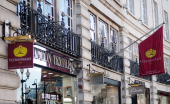 Britain’s oldest Indian restaurant faces closure amid Central London lease dispute
Veeraswamy, the UK's oldest Indian restaurant, is facing the threat of closure just before reaching its centenary, due to a lease disagreement with the Crown Estate.Read More...
Britain’s oldest Indian restaurant faces closure amid Central London lease dispute
Veeraswamy, the UK's oldest Indian restaurant, is facing the threat of closure just before reaching its centenary, due to a lease disagreement with the Crown Estate.Read More... -
 Communities invited to nominate beloved UK traditions for National Heritage List
This summer, communities across the UK will be able to nominate their favourite traditions—from iconic celebrations like Notting Hill Carnival and Hogmanay to time-honoured crafts likeRead More...
Communities invited to nominate beloved UK traditions for National Heritage List
This summer, communities across the UK will be able to nominate their favourite traditions—from iconic celebrations like Notting Hill Carnival and Hogmanay to time-honoured crafts likeRead More... -
 £20m museum renewal fund opens for England’s civic museums
Civic museums across England can now apply for a share of the new £20 million Museum Renewal Fund, aimed at boosting access to collections, enhancing educational programmes, andRead More...
£20m museum renewal fund opens for England’s civic museums
Civic museums across England can now apply for a share of the new £20 million Museum Renewal Fund, aimed at boosting access to collections, enhancing educational programmes, andRead More... -
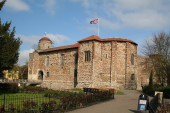 The underrated UK city that was England’s first capital — 1,000 years before London
Tucked away in Essex lies a city that predates London as England's capital by over a millennium. Rich in Roman and medieval history, Colchester only officially became a city in 2022 as part ofRead More...
The underrated UK city that was England’s first capital — 1,000 years before London
Tucked away in Essex lies a city that predates London as England's capital by over a millennium. Rich in Roman and medieval history, Colchester only officially became a city in 2022 as part ofRead More... -
 Universal Studios to open first UK theme park in Bedford by 2031, creating 28,000 jobs
The UK is officially getting its first Universal Studios theme park, with a grand opening set for 2031. The landmark project, backed by the UK government, is expected to bring in a staggeringRead More...
Universal Studios to open first UK theme park in Bedford by 2031, creating 28,000 jobs
The UK is officially getting its first Universal Studios theme park, with a grand opening set for 2031. The landmark project, backed by the UK government, is expected to bring in a staggeringRead More... -
 MI5 lifts the veil on 115 years of secrets in new exhibition
For the first time in its 115-year history, MI5 is pulling back the curtain on its shadowy past. A new exhibition at the National Archives in London, MI5: Official Secrets, offers the public anRead More...
MI5 lifts the veil on 115 years of secrets in new exhibition
For the first time in its 115-year history, MI5 is pulling back the curtain on its shadowy past. A new exhibition at the National Archives in London, MI5: Official Secrets, offers the public anRead More... -
 Tourist tax could help revive London’s arts and culture scene
A growing number of voices are calling on the government to allow London to introduce a tourist tax, similar to those already in place in many popular European cities. The Centre for LondonRead More...
Tourist tax could help revive London’s arts and culture scene
A growing number of voices are calling on the government to allow London to introduce a tourist tax, similar to those already in place in many popular European cities. The Centre for LondonRead More... -
 £1bn Chinese ceramics gift to British Museum approved
The Charity Commission has officially approved the largest donation in the British Museum’s history—a collection of Chinese ceramics valued at around £1 billion.Read More...
£1bn Chinese ceramics gift to British Museum approved
The Charity Commission has officially approved the largest donation in the British Museum’s history—a collection of Chinese ceramics valued at around £1 billion.Read More... -
 UK to return Nazi-looted painting to Jewish family
A 17th-century painting stolen by the Nazis in 1940 from a Jewish art collector in Belgium is set to be returned to the collector’s descendants, the British government announced on Saturday,Read More...
UK to return Nazi-looted painting to Jewish family
A 17th-century painting stolen by the Nazis in 1940 from a Jewish art collector in Belgium is set to be returned to the collector’s descendants, the British government announced on Saturday,Read More...

British Queen celebrates
Most Read
- Teen held after US woman killed in London stabbings
- Heave-ho Harry! Prince prepares to join the walking wounded in ice trek to North Pole
- Football: Farhad Moshiri adamant Everton deal above board
- "Master of English Style". Interview with Designer Lydia Dart
- Letter to the Financial Times from Lord Mayor Alderman Michael Bear
World News
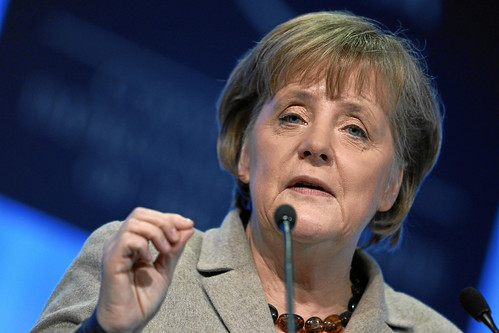
Police in Moldova have arrested a 23-year-old man on suspicion of throwing an incendiary device towards the motorcade of visiting German Chancellor Angela Merkel.
The Interior Ministry said the object flew over the car of Prime Minister Vlad Filat, who was returning to Chisinau after a trip with Mrs Merkel to the country's famous Cricova wine cellars.
Officials have not specified what the device was, but said it did not explode despite being on fire. No-one was injured in the incident on Wednesday.
Eyewitnesses quoted by Prime TV said the device landed "tens of metres" from Mrs Merkel's car, something police refused to comment on.
Police later said that the suspect was not connected to a terrorist organisation. They said he had a previous criminal record but did not provide further details.
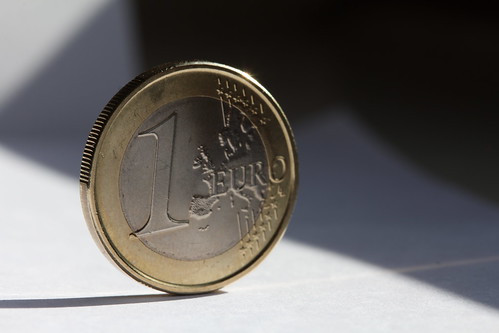
Greek Prime Minister Antonis Samaras meets Eurogroup chief Jean-Claude Juncker in Athens on Wednesday, launching a diplomatic marathon to win better bailout terms for Greece.
In an interview to German daily Bild, Samaras said that Greece needed more time to make spending cuts and reforms that are necessary to unlock the next installment of the country's EU-IMF rescue package on Wednesday.
"All we want is a little 'breathing space' to revive the economy quickly and raise state income," he was quoted as saying.
"Let me be very clear. We are not asking for additional money. We are sticking by our commitments and are meeting all our requirements," he underlined.
Greek daily Kathimerini reported on Wednesday that the Greek prime minister will try to secure Juncker's full support for the government's plans to meet its commitments to its European partners.
Following Juncker's visit, the Greek premier will meet German Chancellor Angela Merkel in Berlin on Friday and French President Francois Hollande in Paris on Saturday.
Merkel and Hollande, leaders of the eurozone's top two economies, are set to meet in Berlin on Thursday, with Greece expected to be part of their agenda.
"The aim is to discuss flexibility in return for assurances and the two want to have a common line before the arrival of the Greek prime minister," Claire Demesmay, of the German Council on Foreign Relations, told AFP.
Ulrike Guerot, a political scientist at the European Council of Foreign Relations, said the meeting would be closely watched in view of crucial decisions expected next month.
"The markets want to know if visions are the same in Berlin and Paris," she said.
France is considered more flexible than Germany towards modification of the austerity programme that is part of Greece's rescue deal.
Vokler Kauder, parliamentary head of Merkel's party, told German weekly Der Spiegel on Sunday that Greece had "no room for manoeuvre".
Greece is in the process of finalising a spending cuts programme of about 11.5 billion euros ($14.3 bn) for 2013 and 2014, necessary in order to access the next installment of its bailout package that amounts to nearly 31 billion euros.
Most cuts are reported to come from salaries, pensions and benefits and have caused friction within the conservative-led, three-party coalition government.
A Greek finance ministry source told AFP on Wednesday that an additional 2-2.5 billion euros in spending cuts "cannot be ruled out" because of the reduction in salaries and pensions that will diminish the taxes collected by the state.
The so-called troika of auditors of Greece's international EU, IMF and European Central Bank creditors is expected in Athens in September, to report on the country's progress in implementating its reform programme.
The report will determine whether Greece will receive the next much-needed payment from its rescue package.
The country has fallen behind in the implementation of structural reforms, as back-to-back elections in May and June resulted in a two-month political deadlock.
But in seeking a two-year reprieve Samaras sould be able to invoke a clause in the second bailout package signed in March that allows for an extension to the programme in case of a "deeper than expected recession."
As the country struggles with its fifth year of recession, predictions now are that its economy will contract 7 percent in 2012, considerably more than the initial 4.5 percent estimate.
Last week Juncker played down rumours of a possible Greek exit from the eurozone, which have recently become louder.
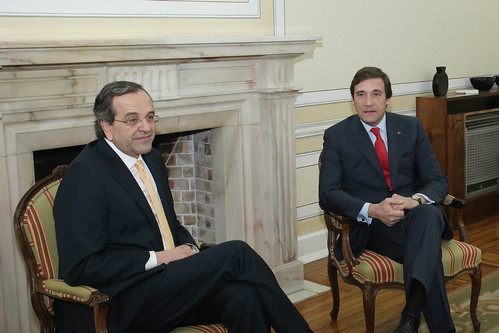
Greece's prime minister has insisted ahead of a visit to Germany that Athens does not want more money from creditors, but indicated it would like more time to enact reforms and spending cuts.
Antonis Samaras pledged before coming to power to seek a two-year extension to the deadline for implementing unpopular cuts demanded in exchange for international aid.
But creditors such as Germany are reluctant to grant significant concessions.
Mr Samaras will meet German Chancellor Angela Merkel on Friday. He was quoted as telling the Bild daily: "We are not asking for extra money."
He added: "All we want is a little 'air to breathe' to get the economy going and increase state income." Mr Samaras said that "more time does not automatically mean more money".
The Greek leader vehemently rejected the suggestion that it might be better for his country to leave the 17-nation euro and bring back its former currency, the drachma. That, he told the Bild, would result in "a catastrophe for Greece" and economic collapse.
Mr Samaras pledged before coming to power to seek a two-year extension to the deadline for implementing unpopular cuts demanded in exchange for two massive international aid packages worth 240 billion euro (£189 billion) that are keeping Greece afloat.
But delays in implementing reforms and austerity measures have fuelled impatience in Germany - the largest single contributor to the bailouts - and other eurozone countries.
Luxembourg's prime minister Jean-Claude Juncker, who chairs the eurozone finance ministers' meetings, is due to arrive in Athens. Later, Mr Samaras will head to Berlin and Paris on Friday and Saturday for talks with German chancellor Angela Merkel and French president Francois Hollande.
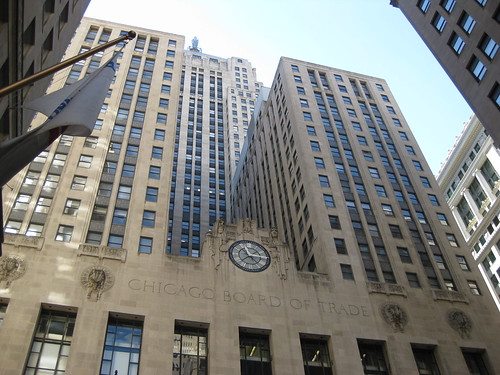
CME Group, the world's largest futures market operator, said Monday it was seeking British regulatory approval to set up a European exchange based in London.
Chicago-based CME, which owns the Chicago Mercantile Exchange, the Chicago Board of Trade and the New York Mercantile Exchange, said it was applying to Britain's Financial Services Authority to create a London-based market currency futures market in mid-2013.
"We continue to see an increase in business coming from our diverse set of customers in Europe, with more than 20 percent of our volume now originating from the region," said Terry Duffy, CME Group executive chairman and president, in a statement.
"Having an exchange in London that can leverage the central counterparty model of CME Clearing Europe will allow us to align ourselves even more closely with our regional customers in both listed futures and over-the-counter markets, and provide additional opportunities to our expanding non-US customer base."
CME Group chief executive Phupinder Gill said the company was looking at expanding the London market's transactions to other types of futures trading.
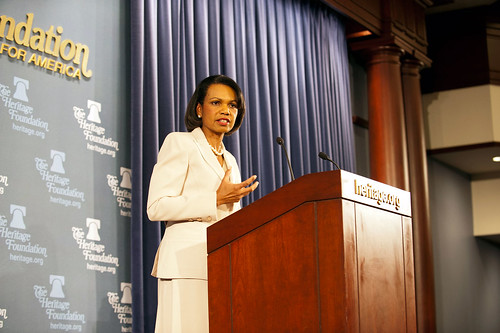
Augusta National, home of the Masters golf tournament, said Monday the exclusive club has admitted the first women members in its 80-year history.
Former US Secretary of State Condoleezza Rice and South Carolina businesswoman Darla Moore have accepted invitations to join the club in Augusta, Georgia, chairman Billy Payne said.
"This is a joyous occasion as we enthusiastically welcome Secretary Condoleezza Rice and Darla Moore as members of Augusta National Golf Club," Payne said.
Augusta National has come under increasing pressure to admit women members, with the question of the exclusive policy coming up each year when the club hosts the first major golf tournament of the year, the Masters.
The issue first came to a head in 2003 when Martha Burk, a leader in the National Council of Women's Organizations, conducted a rally across the street from Augusta National, where the first black member was inducted in 1990.

Germany on Monday poured cold water on a reported plan by the European Central Bank to set a cap on the borrowing costs of debt-wracked eurozone countries, terming it "very problematic."
The ECB itself dismissed the report as "absolutely misleading," saying no such decision had yet been taken.
"Purely theoretically and speaking in the abstract, such an instrument would of course be very problematic but I am not aware of any plans in this direction," said Martin Kotthaus, a spokesman for Germany's finance ministry.
"You know that we basically do not comment on the ECB, which is an independent institution, but I can still say that I do not know about these plans," added Kotthaus in a regular government briefing.
Der Spiegel newsweekly reported on Sunday that the ECB was planning to set a limit on the borrowing costs of individual countries and intervene on the markets to maintain this level.
Spain and Italy have seen their borrowing costs shoot up during the eurozone crisis to levels that forced Greece, Portugal and Ireland to seek a bailout.
The so-called spread, or difference, between benchmark German bonds and those issued by debt-wracked countries would be decisive for the proposed rate cap, Spiegel said.
ECB President Mario Draghi announced earlier in August that his institution "may" buy bonds of struggling countries if they first apply for EU bailout funds and accept tough conditions in return.
He said the details would be worked out before the next meeting of the ECB, scheduled for September 6.
Spiegel said that ECB governors would decide then whether to implement the proposed borrowing cost cap.

Twin earthquakes that devastated rural villages in northwest Iran at the weekend killed a total of 306 people -- most of them women and children -- and injured 3,037, Health Minister Marzieh Vahid Dastjerdi said on Monday.
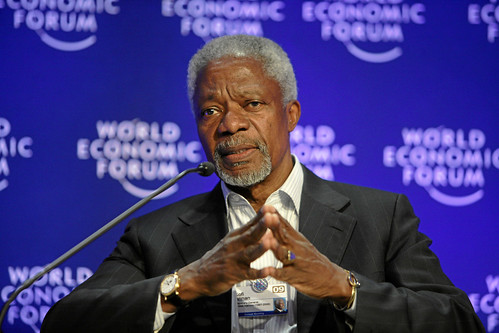
Kofi Annan has quit as peace envoy to Syria with a blistering attack on world powers, ending a frustrating six-month effort that failed to achieve even a temporary ceasefire as the country plunged into civil war.
Former United Nations secretary general Mr Annan also had harsh words for the Syrian regime, saying it was clear President Bashar Assad "must leave office".
Speaking in Geneva, Switzerland, Mr Annan blamed the Syrian government's intransigence, the growing militancy of the rebels and a divided UN Security Council that failed to forcefully back his effort.
Since he took on the job, Russia and China have twice used their veto power to block strong Western and Arab-backed action against Assad's regime.
The White House said Mr Annan's resignation highlighted the failure of Russia and China to support action against Assad and called the regime's continued violence against its own people "disgusting".
"It is impossible for me or anyone to compel the Syrian government and also the opposition to take the steps to bring about the political process," said Mr Annan, a Nobel Peace Prize laureate. "You have to understand, as an envoy, I can't want peace more than the protagonists, more than the security council or the international community for that matter."

A one-ton rover as big as a Mini is due to land on Mars on Monday in one of the most daring space missions ever attempted.
The rover, Curiosity, is designed to search for clues about possible past life in a crater that might once have been filled with water.
The £1.59 billion six-wheeled machine is twice as long and five times as heavy as the twin rovers Spirit and Opportunity which landed on Mars in 2004.
Two British scientists are members of the team which will direct the rover and analyse the data it collects. Before they can do their work Curiosity must land safely on the Red Planet - a challenge that has tested the best brains at the American space agency Nasa.
Because Curiosity is so big and heavy, getting it onto the Martian surface has required a great deal of "thinking out of the box".
The solution is so bold it has been described as "crazy". After entering the Martian atmosphere at 13,200mph, the capsule containing Curiosity will be slowed by friction and then a supersonic parachute.
An "upper stage" resembling a flying bedstead will then be deployed, firing retro rockets to brake its descent. As it hovers over the landing site, the upper stage will transform itself into a "sky crane" and lower Curiosity to the surface on the end of a tether. It will then break away, and deliberately crash.
Statistically the odds do not look good. Two-thirds of all Mars missions have failed, including Britain's ill-fated Beagle 2, which was lost on Christmas Day 2003.

A Mississippi couple got the shock of their lives when the pastor at the church they attended told them the wedding they planned could not be held there because they are black, ABC television reported.
Pastor Stan Weatherford told the network there had never been a wedding for blacks at the First Baptist Church in Crystal Springs, Mississippi, since it was opened in 1883.
He said some of the white congregarion so virulently opposed the wedding of Charles and Te'Andrea Wilson, who are black, that they threatened to have him fired.
Weatherford, a pastor who is white, offered to wed the Wilsons down the road at a mostly black church, he told the network.





















